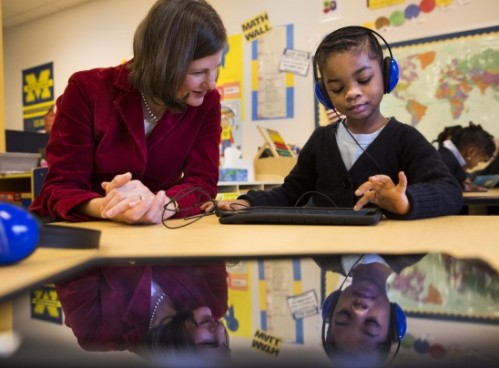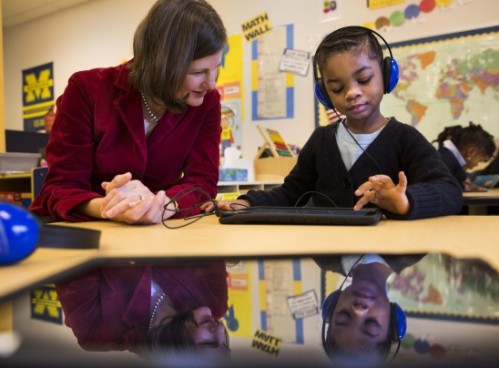It is not a rare sight these days to spot a toddler with a smartphone in hand. As a matter of fact, Generation Alpha shows great prospects of becoming the most tech-savvy generation of all time.
Research shows that children spend about 7.5 hours in front of a screen when they reach the age of 8.
Whether you like it or not, you have to swallow the hard pill that these kids are going to grow up with a smartphone in their hands.
So, instead of ranting and raving, why not take this opportunity and use this habit to our advantage? The conventional methods of teaching are transforming, and educational institutes are pondering ways to modernize their teaching methods.
Traditional teaching methods are slow and rigid. They don’t work on every child and usually undergo extensive procedures before becoming subject to modifications.
One promising way to modernize teaching is by incorporating educational games. Researches have shown that students score 14 percent higher in assessments upon the addition of gamified elements. Not only that, but they also show a further 9 percent increase in the retention levels as well.
In addition to being more interactive, educational games result in self-motivation through rewards, feedback, and points.
Let’s delve deeper and explore six research-backed benefits educational games have on the mental abilities of the children.
Prepare them for Real Life
Children love to role-play. In other words, they simulate real-life scenarios and re-enact activities they see in daily life, in an attempt to understand the world.
Experiments conducted on preschoolers suggest that children, as young as three years of age, make the distinction between pretend-play and realistic scenarios, and actively engage in games that help them master the activities of adults.
Studies have also revealed that pretend-play is connected with self-regulation. When children spend time playing games of such sort, they learn to control impulses and emotions. It also brush-up their attention span.
Apart from the cognitive benefits, educational games not only give children a gist of the way things work as grownups, but they also help them acquire a taste for certain professions early on.
Encourage Creativity
The thing with children is that if you give them one chance, they will spill their creative colors all over the place. We’re sorry if it reminds you of your stain-laden bed sheets or a wall that your little Picasso sees as a canvas.
Educational games help kids unleash their imagination and come up with creative approaches while solving problems.
Psychologists say that there are two types of problems: convergent and divergent. The former requires a single correct solution. The latter, however, yields multiple correct solutions.
In one experiment, kids were provided with two types of material —one for convergent activity (i.e., puzzle pieces), and the other one for divergent activity (i.e., blocks). It turned out that the kids who engaged in divergent problem-solving exhibited much more creativity.
Online gaming platforms have emerged as a medium for kids to channel their creative instincts into something meaningful. Numerous games allow kids to create art and reward them for it. It further strengthens the creative ideas of kids.
On top of it, kids-friendly platforms like airG MiniMe 500c, etc., come with a bunch of other exciting educational games and videos that are sure to spark the creative thinking of your kids.
Trigger Executive Functioning
Educational games push the children to kick in their executive functioning — allotment of mental resources to come up with rapid decision making and efficient problem-solving.
At the core of every educational game, lies a challenge. As the children play video games, they push their mental limits and put flexible thinking into good use as they try to overcome the challenges.
But what exactly is flexible thinking? Simply put, it allows the children to be able to see more than one solution to a problem.
So, when a video game poses a problem, a child is expected to devise multiple strategies, weigh their odds of success, and execute the most feasible solution.
Brain-teasers, puzzles, and strategy-based games bolster critical-thinking in the kids since they make use of their judgment and reasoning abilities to the fullest.
Improve Hand-Eye Coordination
Hand-eye coordination involves the simultaneous use of eyes and hands during an activity. When the concept is applied to video games, children use their hands to operate a mouse, keyboard, or a mobile phone screen while they infer visual data using their eyes.
Studies indicate that children who play video games grow up to perform well at jobs that require good hand-eye coordination.
One study, conducted on surgeons in 2007, suggested that the inexperienced surgeons—ones who were fond of playing video-games—outperformed the most experienced surgeons in their fields.
Survival games encapsulate hand-eye activities well. When the time is running out, and there is an objective to achieve, children have to rely on their hand-eye coordination to make split-second decisions.
All in all, educational games provide a great chance to improve decision-making skills in kids and hone their hand-eye coordination at an early stage of life.
Improve Attention and Vigilance
Sure, attention and vigilance are the apparent prerequisites for children to make the most of their time. However, things get interesting when we dissect them further.
Firstly, video games improve spatial attention in children. It is the very cognitive component that comes into play when children try to spot the target stimuli among numerous distractors.
Next comes the reduced impulsiveness. Educational video games demand sticking to the target. Therefore, children are tested on how long until they respond to non-target stimuli.
What’s more, educational games could also act as the counteragent for attention disorders in children.
A 2016 survey conducted by the Center for Disease Control and Prevention (CDC) suggested that 6.1 million children have been diagnosed with ADHD in the United States.
With that being said, ADHD can be treated through video games, according to Psychology Today. Another study indicates that Dyslexia, a neurological condition, can be alleviated when the patients are exposed to video games.
Reinforce Memory
If your kid shows the tendency to forget the lessons learned in schools, educational games might be the savior you were looking for.
Experts believe that video games rewire the children’s brains, and improve their neural connectivity and memory.
A study conducted by the Cognitive Neuroscience Society (CNS) to find the effect of video games on the working memory of the children revealed that the children got better and better as they spent more time playing games.
Not only that, they even showed signs of incorporating multiple strategies as the conditions were changed, and difficulty levels were increased.
Thus, it was proved that game-based learning could help improve the working memory of the kids.
Let the Game Begin!
The positive effects of video games convincingly outweigh the negative ones if you keep the gaming activities in check. Numerous researches have found that video games have a healthy effect on children’s mental growth.
We hope that you enjoyed reading the blog. Let us know your thoughts in the comment section and don’t hesitate to ask any questions.





















![Top 12 interesting careers to explore in big data [Infographic]](https://crayondata.ai/wp-content/uploads/2016/10/education-1.jpg)
